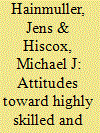|
|
|
Sort Order |
|
|
|
Items / Page
|
|
|
|
|
|
|
| Srl | Item |
| 1 |
ID:
099283


|
|
|
|
|
| Publication |
2010.
|
| Summary/Abstract |
Past research has emphasized two critical economic concerns that appear to generate anti-immigrant sentiment among native citizens: concerns about labor market competition and concerns about the fiscal burden on public services. We provide direct tests of both models of attitude formation using an original survey experiment embedded in a nationwide U.S. survey. The labor market competition model predicts that natives will be most opposed to immigrants who have skill levels similar to their own. We find instead that both low-skilled and highly skilled natives strongly prefer highly skilled immigrants over low-skilled immigrants, and this preference is not decreasing in natives' skill levels. The fiscal burden model anticipates that rich natives oppose low-skilled immigration more than poor natives, and that this gap is larger in states with greater fiscal exposure (in terms of immigrant access to public services). We find instead that rich and poor natives are equally opposed to low-skilled immigration in general. In states with high fiscal exposure, poor (rich) natives are more (less) opposed to low-skilled immigration than they are elsewhere. This indicates that concerns among poor natives about constraints on welfare benefits as a result of immigration are more relevant than concerns among the rich about increased taxes. Overall the results suggest that economic self-interest, at least as currently theorized, does not explain voter attitudes toward immigration. The results are consistent with alternative arguments emphasizing noneconomic concerns associated with ethnocentrism or sociotropic considerations about how the local economy as a whole may be affected by immigration.
|
|
|
|
|
|
|
|
|
|
|
|
|
|
|
|
| 2 |
ID:
072262


|
|
|
|
|
| Publication |
2006.
|
| Summary/Abstract |
Recent studies of public attitudes toward trade have converged on one central finding: support for trade restrictions is highest among respondents with the lowest levels of education. This has been interpreted as strong support for the Stolper-Samuelson theorem, the classic economic treatment of the income effects of trade that predicts that trade openness benefits those owning factors of production with which their economy is relatively well endowed (those with skills in the advanced economies) while hurting others (low-skilled workers). We reexamine the available survey data, showing that the impact of education on attitudes toward trade is almost identical among respondents in the active labor force and those who are not (even those who are retired). We also find that, while individuals with college-level educations are far more likely to favor trade openness than others, other types of education have no significant effects on attitudes, and some actually reduce the support for trade, even though they clearly contribute to skill acquisition. Combined, these results strongly suggest that the effects of education on individual trade preferences are not primarily a product of distributional concerns linked to job skills. We suggest that exposure to economic ideas and information among college-educated individuals plays a key role in shaping attitudes toward trade and globalization. This is not to say that distributional issues are not important in shaping attitudes toward trade-just that they are not clearly manifest in the simple, broad association between education levels and support for free trade.
|
|
|
|
|
|
|
|
|
|
|
|
|
|
|
|
| 3 |
ID:
073981


|
|
|
|
|
| Publication |
2006.
|
| Summary/Abstract |
Are most voters opposed to globalization? A growing body of empirical research, using data from available surveys of public opinion, suggests that antiglobalization sentiments are strong, especially among blue-collar workers. This article reports the findings from a survey experiment aimed at measuring the impact of issue framing on individuals' stated attitudes toward international trade. Respondents given an antitrade introduction to the survey question, linking trade to the possibility of job losses, were 17 percent less likely to favor increasing trade with other countries than were those asked the same question without any introduction at all. Curiously, respondents who were given a protrade introduction to the question, suggesting that trade can lead to lower prices for consumers, were not more likely to express support for trade than those who received no introduction. In addition, the responses of less educated individuals were more sensitive to framing effects than those of highly educated individuals. Without measuring and taking these types of framing effects into account, opinion surveys offer unreliable guides to gauging the extent (and distribution) of opposition to trade among voters. Results from a second experiment reveal that knowledge of the endorsement of trade openness by economists mitigates framing effects and raises overall support for trade liberalization by a substantial degree.
|
|
|
|
|
|
|
|
|
|
|
|
|
|
|
|
|
|
|
|
|